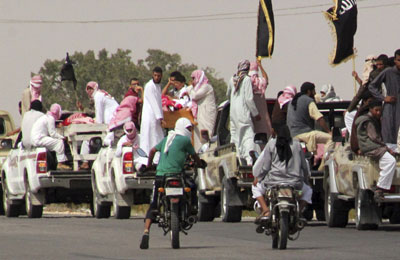
A funeral convoy carrying the bodies of four
militants, drives through Sheikh Zuweid in Sinai.
Sinai air strike shows Israel-Egypt security 'ties'
Jerusalem, August 12, 2013
By Dan Williams and Yasmine Saleh
Just as they were preparing to launch their rocket across the border into Israel on Friday, four Islamist guerrillas in Egypt were killed by a missile.
Al Qaeda blamed Israel for the attack in the Egyptian Sinai near Gaza, where there has been a decade of fighting between Palestinians and Israelis. Israel dismissed reports of its responsibility and said it respected Egypt's sovereignty.
Egypt's armed forces, struggling to impose order after they toppled Islamist President Mohamed Mursi last month but wary of upsetting Egyptians by appearing to cooperate with Israel, said Israel was not involved.
They said the Rafah strike came from an Egyptian helicopter as part of efforts to crack down on Al Qaeda in Sinai, a lawless desert peninsula that is home to an increasing number of militants who are also a threat to stability in Egypt.
However, sources briefed on Israeli-Egyptian relations and military experts said there must have been cooperation.
"Both Israel and Egypt were coordinating closely on Rafah this time around. I very much doubt that anything was done outside the framework of that coordination," one source who declined to be identified by name or nationality told Reuters.
The source said that in the hours leading up to the air strike, the security services of both countries had been working together to thwart a jihadi threat in the Rafah area.
The source would not elaborate on the threat, but noted that, exactly a year ago, Islamist gunmen killed 16 Egyptian border policemen in the same area, commandeered one of their armoured cars and smashed through the nearby border with Israel. The episode ended when the Israeli air force bombed the vehicle.
Other sources said Israel had indeed carried out the strike with Egypt's consent or suggested Egypt did the shooting, but with Israel's help.
CROWDED SKIES
Playing down Israel's role in the missile strike, the source noted that in recent weeks Egypt has sent Apache helicopter gunships on patrol over Rafah. The choppers have strayed into Gazan airspace on occasion.
On Sunday, Egyptian military sources said army helicopters killed 15 jihadis in overnight sorties elsewhere in Sinai, which has been kept largely demilitarized since a 1979 peace deal.
Israel regularly flies its own Apaches, as well as other military aircraft, on its own side of the border barely 7 km (4.5 miles) from the site of Friday's air strike.
"My first thought when I heard about it was that this probably came from a helicopter," the source said. "It could have been an Egyptian helicopter, or maybe an Israeli helicopter. Because of the proximity of the jurisdictions I reckon a casual viewer would have trouble telling them apart."
Two Egyptian security sources said the strike was carried out by an Israeli drone, with the knowledge and cooperation of the Egyptian authorities. The jihadi group which lost four rocket crewmen also said Israel used a drone against them.
Cairo has boosted cooperation with Israel since Mursi's July 3 ouster, asking its neighbour to ready drones near the border in case the Egyptian army needed them to help fight militants in the Sinai, one of the Egyptian security sources said.
Part of Israel's reticence over Friday's incident could be due to the fact it has never confirmed having armed drones, though it openly uses the pilotless planes for surveillance.
Robert Hewson, an IHS Jane's airpower analyst, said Israel often deploys drones at high altitudes where they are very difficult to see unaided, and can use missiles that produce little smoke or sound before impact.
"UAVs (unmanned aerial vehicles) are, by their very nature, stealthy. Few people can honestly say that they have knowingly witnessed a UAV attack," Hewson said.
SHARING COORDINATES
Hewson suggested that Israeli surveillance drones, with powerful cameras capable of peering into Egypt from within Israel, may have contributed to Friday's air strike by relaying the jihadis' coordinates to whoever fired the missile at them.
Giora Eiland, a former Israeli national security adviser and retired army general, was sceptical, however, about the possibility of any real-time tactical cooperation between the Israeli and Egyptian militaries.
"There's no operational coordination in the sense of 'either we'll attack or you'll attack', but there is intelligence cooperation (which) I reckon is now at a higher level because of the greater trust and common ground between the sides," Eiland told Israeli Army Radio in an interview.
He gave credence to the Egyptians' official account of Friday's incident, saying they "have all of the capabilities, including the ability to operate from the air, and at short notice, against such (rocket) squads ... It's a relatively simple operation."
Though Israel sees a growing menace from al Qaeda in Sinai, as well as in arms smuggling through the lawless peninsula to hostile Palestinians in Gaza, it would be loath to breach Egyptian territory with unilateral military action. - Reuters







